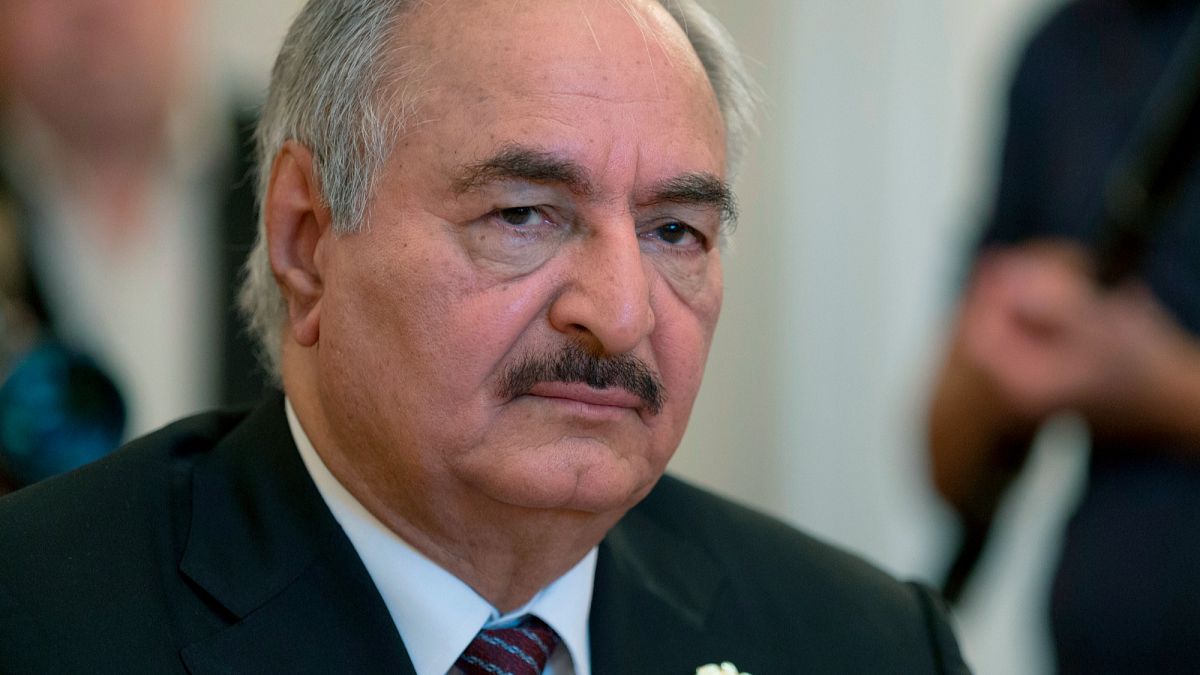European Commissioner for Migration Magnus Brunner and three ministers from EU countries were expelled from Libya on Tuesday due to a “protocol problem”, according to Brussels.
Sources told Euronews the issue arose after they wanted to meet General Khalifa Haftar, who controls large parts of eastern Libya.
Following a meeting with the Libyan government of national unity (GNU) in Tripoli, the European delegation was scheduled to meet with Haftar in Benghazi to discuss migration.
However, Haftar apparently tried to force the EU’s hand by imposing the presence of his ministers, which then led to the expulsion of European officials as “personae no gratae”.
“It was simply a ruse on Haftar’s part to try and legitimise his government and the civilian face of his military dictatorship”, says Tarek Megerisi, senior researcher at the European Council on Foreign Relations (ECFR).
“He declared European diplomats personae non gratae and essentially sent them back to Europe because he was unable to use them for this political charade he was trying to pull off,” he believes.
A divided country
After the civil war and the fall of Muammar Gaddafi in 2011, Libya eventually became divided into two. In the west of the country, the UN-recognised government of national unity is led by Prime Minister Abdel Hamid Dbeibah.
The east is controlled by Haftar, head of the self-proclaimed Libyan National Army. And Brussels formally recognises only the government in Tripoli.
“The European Union is working with the government of national unity, which emerged from the United Nations mediation process as an internationally recognised national executive. The UN is engaging with the authorities throughout the country in line with our One Libya policy”, said Anouar El Anouni, European Commission spokesman for foreign affairs.
However, faced with the absence of centralised governance, territorial division and the challenge of migration, the EU is also engaging with non-state actors.
“At a lower level, the EU is also interacting with militia leaders and groups running detention centres. At the level of member states and some EU representation, they engage with the Haftar family as the de facto rulers of eastern Libya, for what they claim is political realism,” says Tarek Megerisi.
The European Union is cooperating with Libya to combat illegal immigration and smuggling networks.
“The EU has been working, both the EU and the member states, particularly Italy, with the Libyan coastguard in the west to try and reduce migratory flows in one way or another,” James Moran, former EU ambassador to Libya and associate researcher at the Centre for European Policy Studies (CEPS), told Euronews.
“The EU has also supported Libyan efforts to take back migrants once they are back on Libyan soil. This, of course, has been controversial because there have been a lot of questions about human rights, about the treatment they receive when they are in Libya,” he adds.
The NGO Amnesty International has accused Brussels of complicity in human rights violations against migrants in Libya.
A Russian proxy
In recent years, crossings to Europe from eastern Libya have been on the increase.
“Migration concerns are well known throughout Europe. And since (Haftar) controls such a large part of Libya’s coastline, I think it was logical to talk to him,” Moran said.
“What wouldn’t have made sense would have been to give him any kind of recognition, de facto or otherwise,” he explained.
However, questions remain about the EU’s need to meet Haftar, whose links to Moscow and President Vladimir Putin are well-established.
“We are in the process of strengthening a Russian proxy that is antagonistic to European interests. And so, once all the mess of the current crisis is sorted out, it’s pretty clear that what Europe really needs in Libya is a stable and sovereign government,” Megerisi told Euronews.
In fact, the Haftar family is exploiting migration to try to obtain concessions from the EU, according to Megerisi.
In recent days, the Greek islands have seen a large influx of migrants from Libya, prompting the EU member state to suspend asylum applications from the North African country.
Read the full article here


